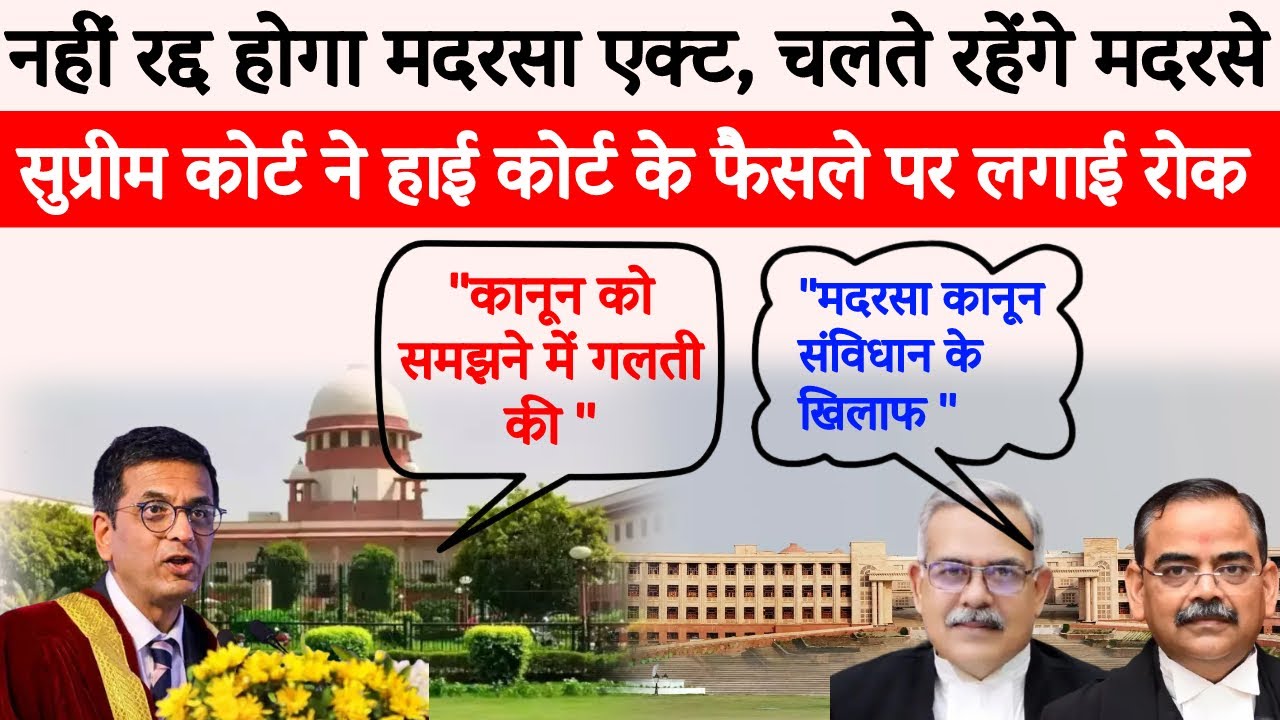


The Supreme Court is set to announce its verdict on pleas challenging the Allahabad High Court's declaration of the Uttar Pradesh madrasa law as unconstitutional. The High Court had deemed the law violative of secular principles and ordered the state government to integrate madrasa students into the formal schooling system. While the CJI has expressed concerns about siloing minorities, the court is also considering the need for regulation and mainstreaming of madrasas for the national interest.
Madrasa Education in Uttar Pradesh: Legal Battles and Implications
The Supreme Court of India is poised to deliver its verdict on a series of petitions challenging the constitutionality of the Uttar Pradesh Madrasa Education Board Act, 2020. The Allahabad High Court had earlier struck down the law as unconstitutional, citing its violation of secular principles. This landmark case has sparked a debate over the role of madrasas in India and the need for their integration into the mainstream education system.
Background
Madrasas, traditional Islamic religious schools, have been in existence in India for centuries. They play a significant role in imparting religious education and preserving Islamic traditions. However, the lack of regulation and oversight has raised concerns about the quality of education provided in many madrasas.
In 2020, the Uttar Pradesh government passed the Madrasa Education Board Act, which aimed to regulate and integrate madrasas into the state's education system. The Act required madrasas to register with the government and follow its curriculum and teaching methods. However, it was challenged in court by various organizations, including the All India Muslim Personal Law Board, which argued that it violated religious freedom and constitutional guarantees.
Allahabad High Court Ruling
In March 2023, the Allahabad High Court declared the Uttar Pradesh Madrasa Education Board Act unconstitutional. The Court held that the law violated the fundamental right to education enshrined in Article 21A of the Constitution. It further argued that the Act was discriminatory against minorities and created a divide between madrasa and non-madrasa students.
Current Developments and Future Implications
The Supreme Court is expected to announce its verdict on the appeals against the Allahabad High Court ruling soon. The outcome of the case will have far-reaching implications for madrasa education in Uttar Pradesh and potentially across India.
If the Supreme Court upholds the High Court's ruling, it will strengthen the argument for the integration of madrasas into the mainstream education system. It may also lead to a more stringent regulation of madrasas to ensure that they meet certain quality standards.
However, if the Supreme Court overturns the High Court's decision, it could reinforce the autonomy of madrasas and preserve their traditional curriculum and teaching methods. It may also raise concerns about the role of religious education in a secular society.
Top 5 FAQs and Answers:
1. What is the controversy surrounding madrasa education in Uttar Pradesh? The controversy centers around the regulation and integration of madrasas into the state's education system. Some argue for stricter regulation to improve quality, while others advocate for preserving madrasa autonomy.
2. What was the Allahabad High Court's ruling on the Uttar Pradesh Madrasa Education Board Act? The High Court declared the Act unconstitutional, citing its violation of secular principles and discrimination against minorities.
3. What is the Supreme Court expected to rule on? The Supreme Court is considering appeals against the High Court ruling and will decide whether to uphold or overturn it.
4. What are the potential implications of the Supreme Court's verdict? The verdict could either reinforce madrasa autonomy or strengthen the case for their integration into the mainstream education system.
5. How does madrasa education differ from regular schooling? Madrasas primarily focus on religious education and Islamic traditions, while regular schools provide a broader curriculum that includes secular subjects.

During a public meeting in Bihar, Union Home Minister Amit Shah dismissed any speculation about leadership changes by firmly stating that there is "no seat vacant" in politics. Praising Chief Minister Nitish Kumar and Prime Minister Narendra Modi, Shah urged the people of Bihar to vote for the NDA in the upcoming assembly elections. He also addressed various issues such as the construction of the Ram Temple and the ban on PFI, while emphasizing the NDA's strong leadership in the state.

Union Home Minister Amit Shah expressed his confidence that the BJP will emerge victorious in the upcoming assembly elections in West Bengal. He also criticized Chief Minister Mamata Banerjee and the ruling TMC for their opposition towards the special revision exercise for the voter list. The minister defended the legitimacy of the process and supported the Election Commission, while the opposition claims it is a ploy to manipulate voter lists before the polls.

Union Home Minister Amit Shah criticised the opposition's manifesto promise of providing government jobs in Bihar if they come into power. Calling it "nonsensical", Shah stated that such a promise is absurd and the opposition knows they will never come to power and will not have to fulfil any promises made. He also pointed out that the opposition's manifesto ignores the development strides made in Bihar, such as electricity and clean water reaching every village.

In an exclusive interview with News18 India, Union Home Minister Amit Shah dismissed Rahul Gandhi's allegations of "vote chori" (vote theft) and assured the people of Bihar that the BJP will take action against every single infiltrator in the country. He also addressed concerns about Nitish Kumar's health and stated that the Bihar CM was holding four rallies a day, proving that there was no question of his health being in poor shape. Additionally, Shah criticized the opposition's attempt to create a negative perception about Nitish Kumar.

In a recent interview with News18 India's "Sabse Bada Dangal Bihar 2025", Union Home Minister Amit Shah confidently stated that the NDA will form a government with an unprecedented two-thirds majority in the upcoming Bihar assembly elections. Shah also vehemently denied any concerns raised by the opposition regarding the health of Chief Minister Nitish Kumar, stating that both he and Kumar are holding four rallies a day. This marks a major shift in the political equation in Bihar, as the BJP and JD(U) are contesting an equal number of seats, a first in the state's electoral history.

PM Modi delivered a speech at the Maritime Leaders' Conclave in Mumbai, praising the government's efforts in revolutionizing and modernizing the country's shipping sector. He emphasized the nation's ports as being among the most efficient in the developing world, declaring that India has made significant progress in this area.

Union Minister Dharmendra Pradhan, who is also the BJP's in-charge for the Bihar polls, has strongly criticized Congress leader Rahul Gandhi for his derogatory comments against PM Modi. Pradhan has demanded a public apology from Gandhi for his remarks, stating that they are against basic norms of public discourse. He further added that this reflects the Congress' deep-rooted resentment and frustration towards PM Modi and his leadership. Meanwhile, Rahul Gandhi has kicked off his poll campaign in Bihar with a scathing attack on PM Modi, accusing him of "enacting all types of drama" for votes and running the state through remote control.

Elon Musk's xAI has launched Grokipedia, an AI-powered online encyclopedia to rival Wikipedia. Musk aims for the platform to be a "massive improvement" and free from any political bias. While Grokipedia currently sources content from Wikipedia, Musk plans to have all original content by the end of the year. This development adds to Bihar's political landscape, where leaders like Lalu Prasad and Nitish Kumar have dominated with their OBC politics, while Nitish's developmental narrative has transformed the state's political landscape.

BJP leader Chandrashekhar Bawankule sparked controversy with his statement that party workers' phones and WhatsApp groups are being monitored ahead of local body elections. Shiv Sena leader Sanjay Raut demanded his arrest, alleging that the phones of several Opposition leaders were also tapped. Bawankule clarified his statement, but the Sena leader questioned the involvement of BJP offices and technology networks, calling it a potentially anti-national act.

The Election Commission (EC) has announced the schedule for Special Summary Revision (SIR) of electoral rolls in 12 states and Union Territories (UTs) for the year 2025, excluding Assam due to the ongoing National Register of Citizens (NRC) process. While the BJP has welcomed the announcement, the Congress has raised concerns and questioned the decision. The Chief Election Commissioner (CEC) has stated that Assam has a separate provision in citizenship laws and the NRC process must be taken into consideration, causing potential delays in the SIR preparations. Despite the physical closure of banks in Ranchi and Patna, financial services will remain available through digital and self-service platforms, so customers are advised to use online banking and plan any in-branch visits accordingly.